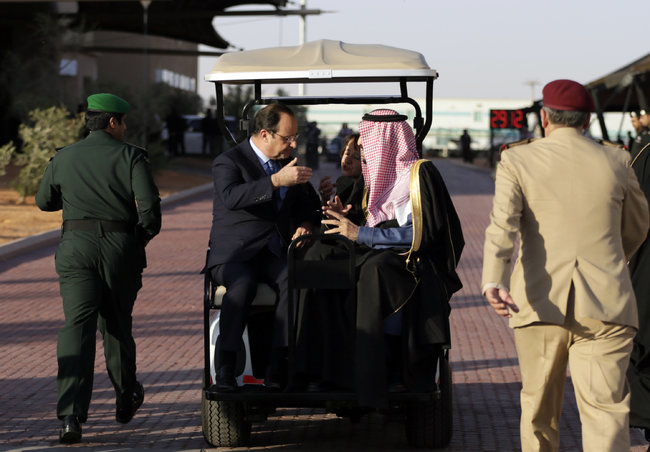
By ANNE BARNARD, New York Times.
BEIRUT, Lebanon — If a wealthy patron were all the Lebanese Army needed to counter the Shiite militant group Hezbollah as the dominant force in the country, the recent $3 billion grant from Saudi Arabia might make a decisive difference in the country’s complex political landscape.
But the Saudi aid package — nearly twice Lebanon’s $1.7 billion annual defense budget — is earmarked to buy French arms and is unlikely to give the army what it needs most, say supporters and opponents of Hezbollah here. And even if it does, they say, it will take years to make an impact.
And while the Saudis are clearly alarmed at Hezbollah’s staying power and its intervention in Syria’s civil war, analysts say the gift announced last week was intended as much to send a message to the United States as to shift the military balance.
Yezid Sayigh, a scholar of Arab militaries at the Carnegie Middle East Center in Beirut, said the Saudis were declaring a “tactical divorce” from the Obama administration over their frustrations with what they see as America’s indecisiveness on Syria and its attempts at reconciliation with Iran, Saudi Arabia’s regional rival and Hezbollah’s patron.
“They’re on the warpath, angry, and that doesn’t make for good policy,” Mr. Sayigh said.
Analysts on both sides agree that if Lebanon’s government, under Saudi pressure, pushed the army to confront Hezbollah, it would risk fracturing the force along political and sectarian lines and destroying the closest thing the country has to a broad-based national institution. Mr. Sayigh said that not even the United States had tried to link aid to Lebanon’s army with action against Hezbollah.
“Those are illusions,” said Talal Atrissi, a Lebanese military analyst who favors Hezbollah. “The Lebanese Army would be dismantled.”
The grant comes as the Syrian civil war intensifies a geopolitical and increasingly sectarian power struggle between two major players in Lebanon: Saudi Arabia, which backs the predominantly Sunni insurgency in Syria, and Shiite-led Iran, an ally of Syria’s government.
The grant was announced as Lebanon’s pro-Saudi Future party buried a top official, Mohamad B. Chatah, who was killed in a bombing for which Future leaders blamed Hezbollah and Syria. And it came weeks after Hassan Nasrallah, Hezbollah’s leader, implicitly blamed Saudi Arabia for growing sectarian tensions and attacks like the November bombing of the Iranian Embassy in Beirut.
Since Lebanon’s 15-year civil war ended in 1990, international promises to establish the army as a guarantor of stability have been undermined by American reluctance to arm it with weapons that could challenge Israel, which officially is still at war with Lebanon. That leaves the army ill equipped to police borders and confront militias. Lebanon is now paying a high price, with Sunni and Shiite militants streaming in and out of Syria and spillover violence erupting around the country.
A national consensus has long allowed Hezbollah to maintain its own force so thatt it alone can defend the country from Israel. Hezbollah, Lebanon’s most powerful political party, rose to prominence fighting to end the 22-year Israeli occupation of southern Lebanon and survived the 2006 war in which Israel vowed to cripple it.
But lately, Hezbollah’s regional popularity from those successes has been dented as its fighters in Syria battle insurgents supported by many Sunnis, in a conflict that began as a struggle for political rights and escalated into armed struggle against President Bashar al-Assad. While Mr. Assad appears unlikely to be dislodged soon, he has struggled to retain the untrammeled power that has guaranteed a Syrian land bridge for Hezbollah’s Iranian-supplied weapons.
The Saudis see “an opportunity,” said Mustafa Alani, the Saudi director of security and defense studies at the Gulf Research Center. “They think Hezbollah lost a lot of legitimacy. They appear like machinery that can be sent anywhere by the Iranian government.”
At the same time, he said, the Saudis did not condition the gift on disarming Hezbollah, did not want direct confrontation with the group and aimed to contain Sunni extremists as well.
“There are no conditions,” Mr. Alani said. “Al Qaeda is also growing in Lebanon and is a major concern for Saudi Arabia.”
Such statements are viewed with suspicion in Lebanon.
Hezbollah’s supporters note that the government rejected a similar offer from Iran in 2010, and that when Saudi Arabia’s Lebanese allies were ascendant — like when Rafik Hariri, a Saudi citizen, was prime minister — the kingdom was content to work through them, not institutions. They see the Saudis acting not from a position of strength, but in a fit of pique as their ambitions to weaken Iran and Syria falter.
Haytham Mouzahem, an analyst at the online news site Al Monitor, said that even though Hezbollah influences the most important officers, if the package included “secret conditions,” it could create rifts between the army and Hezbollah.
Hezbollah could also credibly quibble with the arms shopping list, which France must approve. Mr. Alani said the package could pay for attack helicopters, artillery and tanks, as well as new infrastructure and a bolstering of the ranks, to 70,000 from 57,000 — but not air defense, “a red line” for Israel. Such weapons would help the army, which struggled in 2007 to subdue a militant group and resorted to dropping grenades from helicopters.
But Mr. Mouzahem said Lebanon also needed ships and fighter planes. He said the Saudis should have financed the army’s existing five-year $4.7 billion modernization plan, with 60 percent for infrastructure like bases, hospitals, training and communications, and 40 percent for weapons. That, Mr. Sayigh said, would better fit their stated goal of institution building, by supporting the army’s American-aided planning process.
But it might not suit another Saudi goal: showing the United States that it is acting in its own interest.
“They are washing their hands of Obama,” Mr. Alani said.